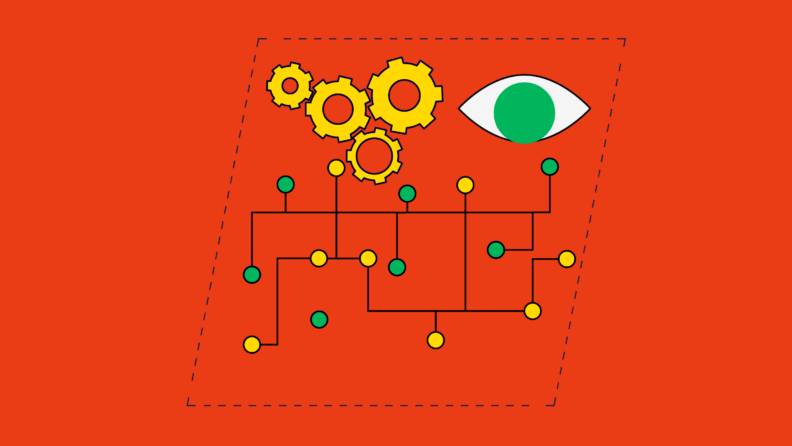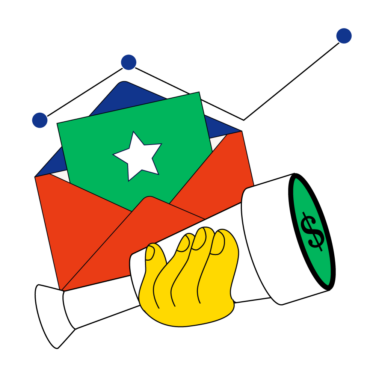AI supercharges lead generation strategies in B2B marketing, significantly optimizing the marketing funnel and improving conversion rates throughout the buyer journey.
Let's dive into six actionable ways to implement AI within your business to help improve your marketing results.
What Is B2B Lead Generation?
Before we jump into the use of AI in B2B lead generation, it’s important to understand what the overall lead generation process looks like today.
B2B lead generation is the process of attracting and capturing businesses who may be interested in your products or services.
Taking it one step further, this process involves using specific tactics to identify, engage, qualify, and convert leads from these businesses.
A Breakdown Of The B2B Lead Generation Process:
The lead generation process really boils down to four primary steps. Let’s take a look at them:
Step 1: Identify Leads
Start by identifying your target audience and defining your ideal customer profile (ICP). Utilize market research, data analysis, and customer segmentation to identify potential leads that match your ICP.
This may be the most important step in the entire process. Start by identifying your target audience by working with your sales reps, customer success, and revenue operations teams to identify your ideal customer profile.
Use behavioral data that will help you identify which companies and personas have a higher propensity to convert. Layer in market data to understand where there may be low-hanging fruit versus fruit that may be harder to reach due to market dynamics at any given point.
Step 2: Engage Leads
Once you have identified potential companies and leads within those accounts, it's time to start engaging them. Start by using tactics to warm up these companies and leads. Spend some time capturing attention, generating interest, and nurturing leads.
Step 3: Qualify Leads
Even with a refined audience, it is important to note that all leads are not created equal. This is why it is critical to focus your time and energy on high-quality leads that have the highest chance of converting into potential customers.
Leverage lead scoring models to help qualify and prioritize your leads effectively. Trust me, your sales organization will love you for doing this.
Work with your sales organization on creating a sales process that helps them qualify leads into opportunities. You may want to incorporate a sales methodology into your sales process which will help standardize your qualification process.
Setting up these processes will help ensure there is a standardized way of how marketing and sales will qualify leads and opportunities. This is a critical step in driving accountability and improving the overall buyer’s journey.
Step 4: Close Leads
Once you have some sales-qualified leads in your sales pipeline, it is time to convert these leads into paying customers. Demonstrate the value of your solution and provide your customer with offers and incentives that will help drive revenue.
Why Use AI For Lead Generation?
Throughout the past two decades, lead generation has evolved through various eras. The classification of these eras can be simplified by understanding the push towards digitization and subsequently what we know now as artificial intelligence today.
As we have seen the progression from traditional cold calling and direct mail to digitization and online marketing, we are now witnessing a pivotal change from an era marked by marketing automation and CRMs to one centered around artificial intelligence.
Benefits of AI Lead Generation
For most marketers who are responsible for lead generation, there are three very distinct business challenges that AI will help solve:
- Improved business process: AI will enable marketers to automate repetitive tasks and processes, increasing operational efficiency and directly impacting cost savings.
- Better data and insights: Marketers today manage an overwhelming amount of data which makes extracting the most valuable insights harder than ever.
- Personalization and customer experience: Customers demand a personalized and tailored customer experience throughout the buyer’s journey.
6 Ways To Use AI For Lead Generation
With some of these business challenges in mind, there are endless ways AI technology can help improve marketing performance.
Here are my top 6 ways you should be incorporating AI within your lead generation strategy:
1. Use Data to Evolve Buyer Personas
With the help of AI, companies can now leverage data to refine and solidify their buyer personas. AI technology and algorithms can be used to identify patterns based on customer data such as lead behavior or buying preference. These patterns can lead to a more accurate buyer persona for your marketing team to go after.
Companies can now tailor their marketing efforts by ensuring they are reaching the right audience with relevant and personalized messaging—a tenant of building a predictable pipeline.
2. Use Chatbots to Streamline the Buying Process
For many companies, AI-powered chatbots have become an essential part of their marketing tech stack. We can thank lots of great brands like Drift for the evolution within this space.
Chatbots behave like virtual assistants that can engage website visitors and provide answers to inquiries and even help qualify leads.
By implementing tools like Drift or Intercom, companies can now offer 24/7 around-the-clock availability and assistance powered by AI. If you want to increase the likelihood of converting website traffic, use an AI-powered chatbot to help guide leads through the sales process and start building sales pipeline today.
3. Find New Accounts to Target
Technology powered by AI has also changed the game for how companies find and target new accounts that align with their ICP (ideal customer profile). Solutions like Clearbit have really taken the manual effort out of finding new accounts by introducing enhanced functionality and a ChatGPT plugin that improves marketing and sales outreach efforts.
By using prompts and queries, companies can now find accounts that match the attributes they are looking for. This ability allows businesses to target high-value accounts and invest more resources in securing these customers.
4. Create a Segmented Email List
Remember that mention I made about improved business processes and reducing repetitive tasks? Well if email list creation and segmentation are taking too much of your time, have no fear, AI is here.
AI can drastically enhance the effectiveness of your email marketing campaigns by creating high-value customer email lists. AI can help analyze customer data and categorize leads based on behavior and preferences.
This kind of segmentation will allow marketing teams to deliver highly targeted and personalized email content to specific audiences and segments. By leveraging AI to personalize email campaigns based on AI-created segmentation, marketing teams can drive real engagement and improve on their lead conversion efforts.
5. Use AI Tools for Lead Qualification
One of my favorite use cases of AI within the lead generation process is using AI for lead qualification. There are now a number of lead generation tools on the market powered by AI that can help automate and optimize this process for you.
AI algorithms can help determine the likelihood of leads turning into paying customers by analyzing contact information. As we know, AI is great at analyzing large amounts of data sets in what feels like real-time. This means you can pivot your lead generation efforts quickly to address the output generated by this technology.
Another great advantage of using AI in the qualification process is that this saves your sales team valuable time to focus on revenue-generating activities instead of manually determining the quality of marketing leads.
AI-driven lead qualification will help ensure that your marketing and sales teams engage with new leads at the right time, increasing the likelihood of successfully converting your leads.
6. Optimize Predictive Analytics
Leveraging AI, companies can now employ predictive analytics to help optimize their lead-generation strategies. Using historical data and conversion patterns, AI algorithms can provide deep insights into the quality of your leads and help predict future outcomes. This can help create a data-driven culture within your organization which many businesses are striving to become.
Another advantage of using predictive analytics is its ability to identify areas of improvement. For example, by analyzing the performance of lead gen campaigns, companies can now double down on what works well and execute strategies that will yield the best results.
AI is the Lead Gen Tool You're Missing
The competitive landscape for many industries is evolving and the use of AI is compounding this acceleration. The front runners within specific product categories will likely use AI throughout their marketing strategies and not limit its use to AI-powered lead generation.
Embracing AI for lead generation will enable businesses to leverage better insights from data, improve customer engagement and ultimately optimize their funnel for better results.
If you enjoyed this article and want to stay atop of the latest trends and technologies in the revenue operations space, be sure to sign up for The RevOps Team newsletter.


